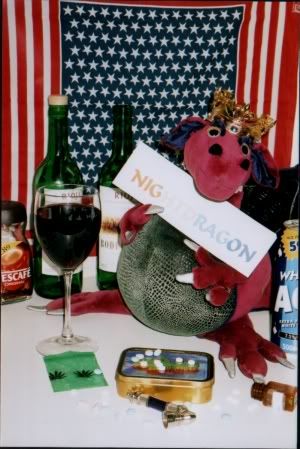
How to tackle binge-drinking: Don�t ignore it
May 04, 2004 ~ 5:31 p.m.
Two chemical related events from the news recently:
Rise in British crime attributable to alcohol
It appears that alcohol is responsible for a leap in violent crimes across Britain. While robbery, burglary and motor vehicle theft are down, violence in city centres across the United Kingdom have risen substantially.
Britain is awash in a binge-drinking culture the likes almost no other nation has experienced. And what�s worse is that law enforcement, while staging a crackdown on drug-related crime, has done almost nothing to control alcohol-fueled crime.
Another great example of how people view alcohol as no big deal, simply because it�s legal, but are hell-bent against the �evil� of drugs.
Frankly, I don�t like the fact that town centers are no-go areas on Friday and Saturday nights because of an overspill of anti-social behavior, the results of which originates from the pubs. There has been no aggressive campaign in Britain to date which would counteract the drunken mob (or drunken yob?) rule that blights the country.
There has got to be an all-out effort to control the binge-drinking culture that currently blights Blighty. Authorities must stipulate that while alcohol is healthy and relaxing when drunk in moderation, people will be answerable to the law if they overdrink and commit assaults or other violent crime while drunk.
Because binge-drinking is seen as cool due to the antics of �hero� soccer players and celebrities, the impressionable young like to follow in their footsteps. This is understandable. But although understandable, it is not acceptable.
This country must start getting tough on binge-drinking�and binge-drinkers.
Clipping Red Bull�s wings?
On Sunday, The People �a paper that I do not consider serious reading but is worth the occasional perusal�reported the effects of drinking five cans of Red Bull on the system of one of its reporters. The journalist drank five cans in succession, her heart rate and tension rising with every finished can.
She was declared unfit to drive after consuming the five cans of stimulant energy drink, reportedly feeling too edgy and excitable. She also wrote that she had trouble sleeping and had a bad headache in the morning.
Well, pardon me, but, no duh! If you consume five cans in a row of a caffeine and sugar-packed drink, you are bound to feel that way. Five Red Bulls would equal nearly 15 cups of sugared coffee. (There is, however, a sugar-free version of Red Bull now on the market.)
France and Denmark have banned the drink, while Sweden considers doing so. That is not the way to deal with the potentially harmful effects of Red Bull.
A few years ago, there was a controversy over mixing alcoholic drinks with Red Bull. This was because the heavy caffeine content in the Red Bull made it hard to judge just how much alcohol the drinker was consuming. People passed out due to taking in more alcohol than they thought they were drinking. The controversy washed over without much becoming of it; bars still sell cans of Red Bull.
Regarding the latest controversy surrounding the drink, I find it hard to imagine that anyone would want to consume five cans of Red Bull. People might drink two in a row, and they would then be quite a tad energetic. However, what kind of science dictated the decisions of two nations to ban the drink because it has the potential to make idiots that drink more than two cans at one sitting very uncomfortable?
True enough, I sure as hell don�t want anybody driving completely wired from too much caffeine. I would punish that as severely as driving while drunk or stoned.
France isn�t about to ban coffee. What�s to stop me from consuming three or four espressos on a lovely warm Ni�ois morning? I can have as much coffee as I like, in France or anywhere. In fact, banning Red Bull for being too heavily caffeinated is as ludicrous as banning Everclear for having too heavy an alcohol content. Or maybe the French think of Red Bull as a religious symbol, hence its ban. (The Danes and Swedes, being Scandinavians, have always been keen to ban substances that either intoxicate or stimulate.)
Banning is not the answer to the Red Bull �crisis.� Slap a warning on the cans. But banning the drink is prohibition, and prohibition is the ultimate evil.
� M.E.M.
|
[Sign My Guestbook]
[View My Guestbook]
|
Copyright � 2001-2007 by M.E. Manning. All material is written by me, unless explicitly stated otherwise by use of footnotes or bylines. Do not copy or redistribute without my permission.
AMERICA FOR TRUE AMERICANS!